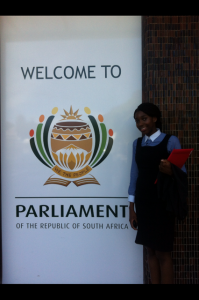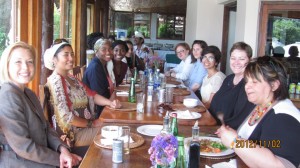The Women’s Legal Centre: Human Rights Internship – Joy Adeniran

Last June, I was selected to undertake the City Law School, human rights internship to the Women’s Legal Centre in Cape Town, South Africa. As an aspiring public law barrister and recent BPTC graduate, this placement provided a fantastic opportunity to build on the skills learnt on the course. I spent three months at the centre.
The Women’s Legal Centre (WLC) is a not for profit, independently funded law centre, established to advance women’s rights within South Africa. The WLC’s predominant focus is on conducting constitutional litigation and advocacy on gender issues, which fall within its five strategic areas. These are violence against women, fair access to resources in relationships, access to land or housing, access to fair labour practices and access to health care.
Within this report I aim to provide an overview of my daily work routine at the WLC, I will then move on to discuss the project work undertaken, and finally end with a discussion on the skills learnt and deployed, whilst working at the centre.
DAILY WORKING LIFE AT THE WLC
The work of an intern at the WLC is very research heavy. One of the first tasks I was assigned to, required me to gather data and draft a short memorandum, on the number of rapes committed in South Africa, and the proportion of those rapes which were reported to the South African Police Service. This task provided a quick overview of the rape crisis in South Africa and provided foundational knowledge, which was to be useful when completing future tasks.
During my time at the WLC, the centre had been appointed as amicus curiae in litigation, (which eventually made its way to the constitutional court), concerning polygamous marriages. The case explored the legal status and rights implications for spouses in such marriages. My first involvement with this case, required research to be conducted on legislation, which conferred a special status on or alternatively, had implications for married women. The examples were to be used by counsel in making arguments to ensure the court’s decision protected and recognised the rights of subsequent wives in polygamous marriages. The potentially wide scope for search meant that I had to deploy my legal research skills carefully, to ensure relevant materials were sourced.
I was later requested to conduct a further piece of research by senior counsel working on the case. Counsel sought to make a very clever argument, which attempted to balance the rights of both wives in the polygamous marriage in question, by distinguishing between void and voidable marriages. Using family and matrimonial law textbooks as my basis, and then exploring case law, I was able to ascertain and present the current position under South African law. It was extremely rewarding, when I was later told in discussion with counsel how my research had impacted arguments in court.

In addition to other pieces of research work, I was also given case management responsibilities. For example, I often had to attend court to clerk, or transfer documents to counsel. I took notes in conference between counsel and expert witnesses, in addition to drafting case summaries and preparing court bundles. The exposure to working life within a law firm, brought to life the practicalities of such work, and solidified lessons that had been taught within my civil and criminal litigation classes.
As a prolific NGO in the Western Cape, the WLC is often invited to attend or host conferences. During my time at the centre, I was able to attend a number of conferences ranging from, the victim empowerment conference, the harmful cultural practices conference, lawyering on the margins and assessing the usefulness of the Commission for Gender Equality one year on. These conferences really added to my experience at the WLC, as they enabled me to build up my knowledge on a number of topics connected to the centre’s work. The conferences also facilitated discourse with other NGOs and activists working in the women’s rights domain.
The beauty of the smaller tasks, be it research or case work, was that they were often, if not always required as part of a larger case or body of work. The attorneys were always very mindful when setting tasks, to provide us with a holistic picture, so that we had a clear understanding of how our work fit into the centre’s work as a whole.
PROJECT WORK
Whilst at the WLC, I had the opportunity to engage in a number of substantial projects alongside the attorneys. This included the creation of a presentation, on behalf of an attorney, who would be attending a consultative meeting in Kenya, on women’s property rights in Africa. The presentation considered the capacity of the advisory opinion mechanism, of the African Court of Human and People’s Rights, to effectively tackle problematic areas of women’s property right’s, prevalent on a continent wide level. My project work also encompassed the exploration of funding options for the WLC, the consideration of the suitability of the recent nominations to the constitutional court, in light of the gender imbalance on the bench and the drafting of an application to the Commissioner of Police, requesting the release of domestic violence statistics.
Another project I worked on, was the drafting of a complaint to the Commission for Gender Equality (CGE), on the lack of state funding for women’s social welfare NGOs, particularly those tackling gender based violence. This was extremely critical, given the widespread third sector funding crisis and the high proportion of social welfare services provided by NGOs in South Africa. The failure of the state to provide such services directly or alternatively to provide funding to organisations, which provide such services, created a clear gap in service provision to women who face gender based violence.
The CGE is tasked by the constitution with the duty to promote the respect for and the protection, development and attainment of gender equality. Moreover, the Commission has the power to monitor, research, lobby and report on issues concerning gender equality. In light of this the complaint sought to challenge the state’s distribution of funding to women’s social welfare NGOs, by demonstrating that its policy was in contravention of its constitutional, regional and international obligations to secure gender equality. The complaint also sought relief from the CGE, in line with its powers.

This task required extensive research on the CGE, its powers and work. I also had to research South Africa’s constitutional, regional and international obligations to fulfil gender equality, under instruments such as the Convention on the Elimination of all Forms of Discrimination Against Women, the Declaration on the Elimination of Violence Against Women, the Protocol to the African Charter on Human and Peoples’ Rights, on the Rights of Women in Africa and the Southern African Development Community Gender Protocol. In addition to this, I conducted cases studies on two social welfare NGOs, Rape crisis and the Saarjtie Baartman Centre, to demonstrate the effect the state’s funding policy had on victims of gender based violence. Once I had gathered the necessary information and evidence, I drafted the complaint, which was then submitted to the relevant NGOs to make the necessary comments, before it was submitted to the CGE.
Although the assignment of such a large scale project was initially daunting, upon completion it was extremely rewarding to have so heavily contributed to such an important project with far reaching effects.
FINAL THOUGHTS: SKILLS LEARNT AND DEPLOYED
During this internship, I learnt a vast amount about the South African legal system, and importantly the context in which this system sits. There is nothing like attending a demonstration organised by the residents from Khayletisha, a local township, against the postponement of a Commission of Enquiry into police practice in the township, to truly gain an understanding of the potential impact of the law. My casework helped to consolidate my learning on civil and criminal procedure and provided insight into the practicalities of legal work. Moreover, the extensive project works undertaken, enabled further development of my research and writing skills, and gave me a better understand of how my legal knowledge could be applied to real problems. Finally, this experience, importantly provided insight into the types of work and the way in which work is conducted in my future practice area. I had a fantastic experience at the centre and believe it contributed to both my personal and professional development.
Thanks to Joy Adeniran, who was awarded a City University Human Rights Scholarship to go to Cape Town. Joy is currently completing her BPTC with us.
